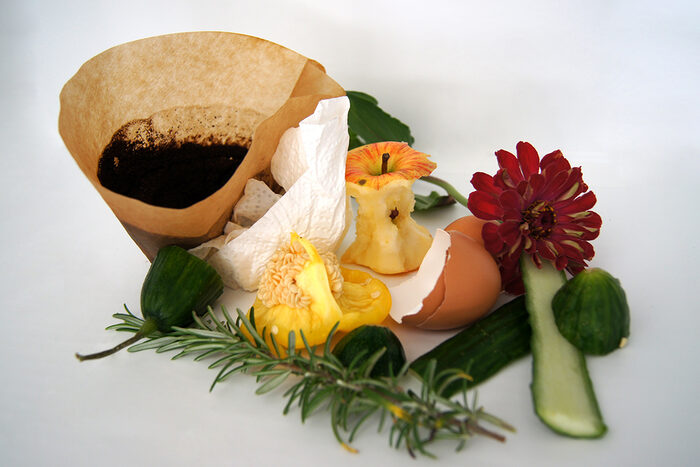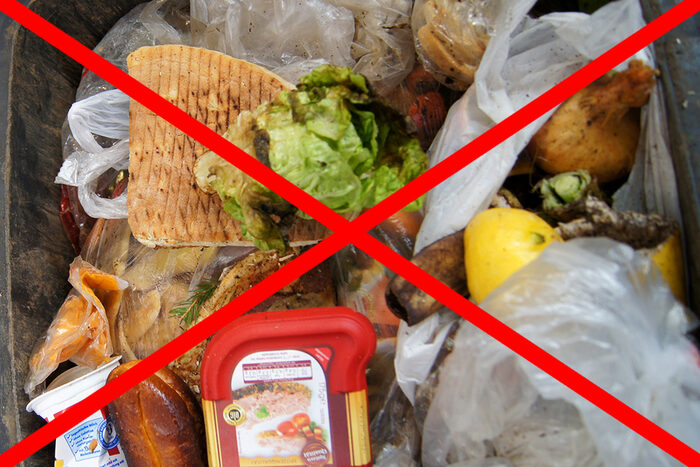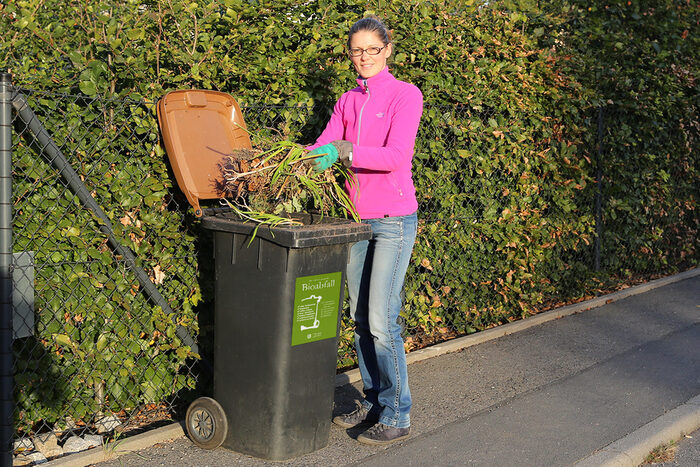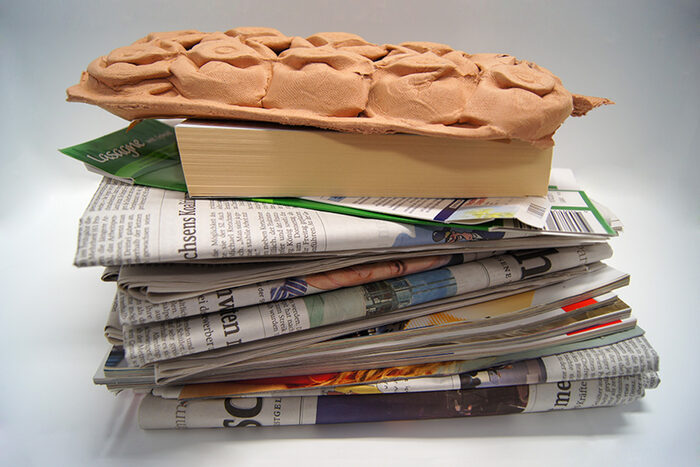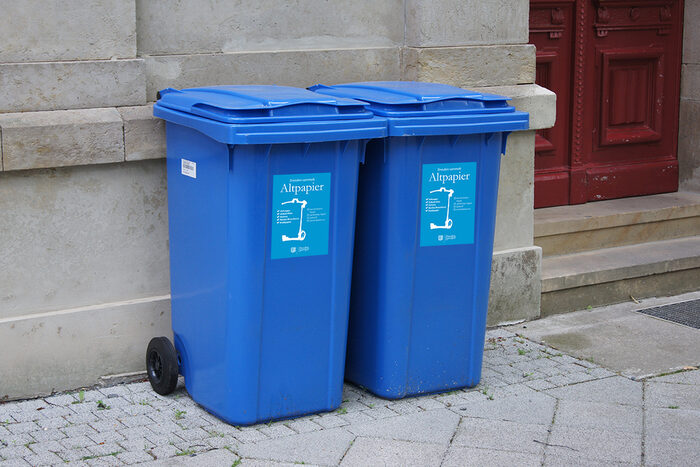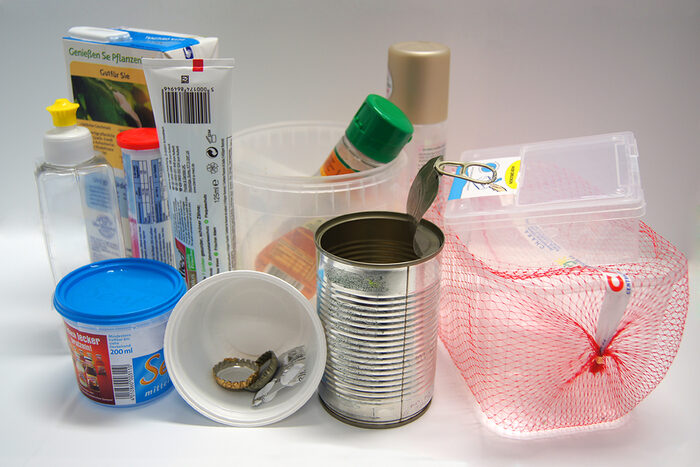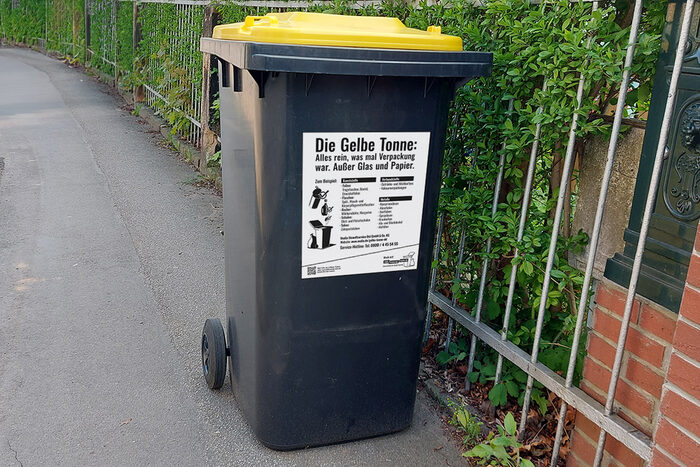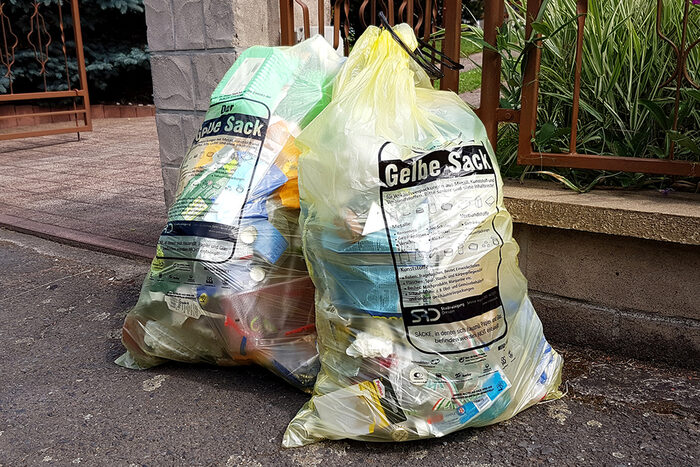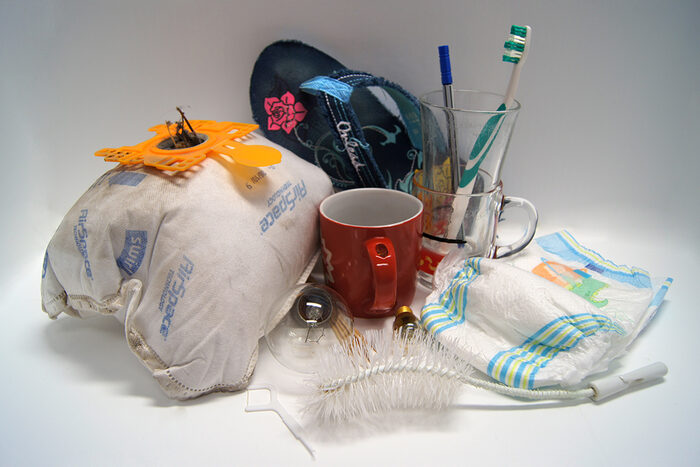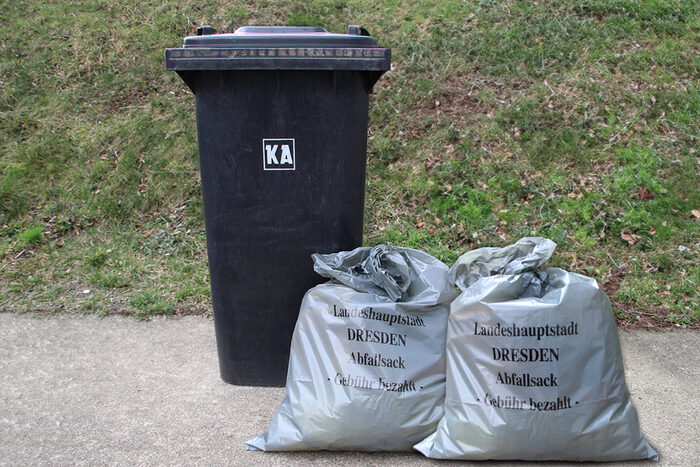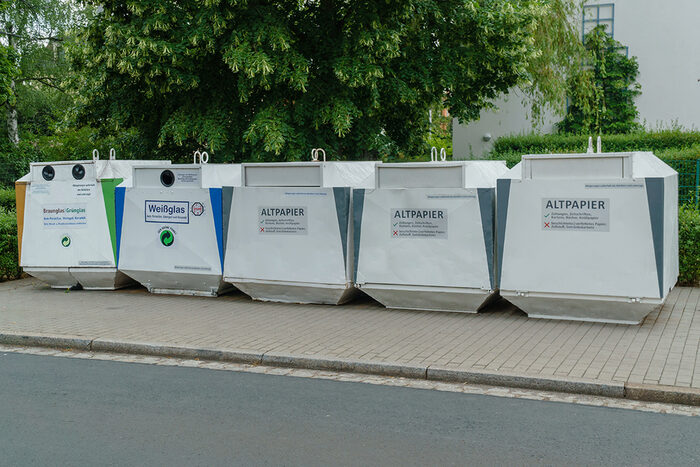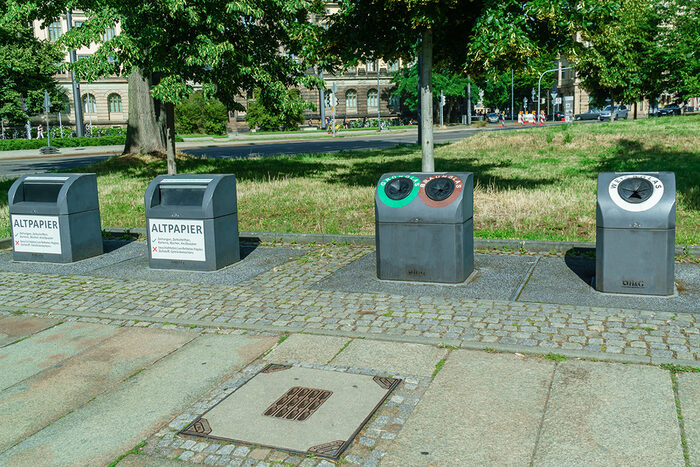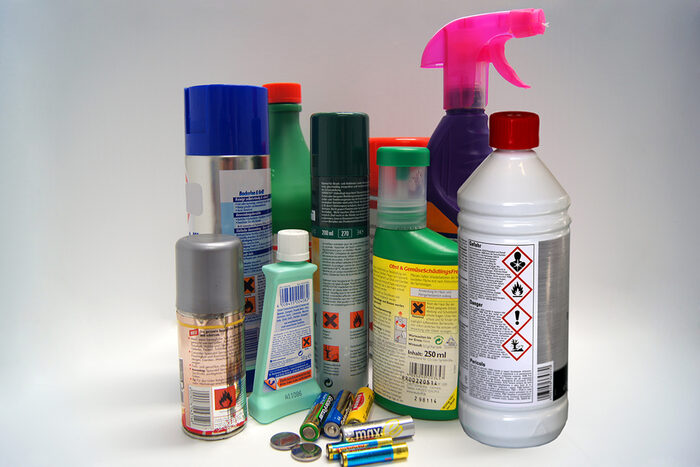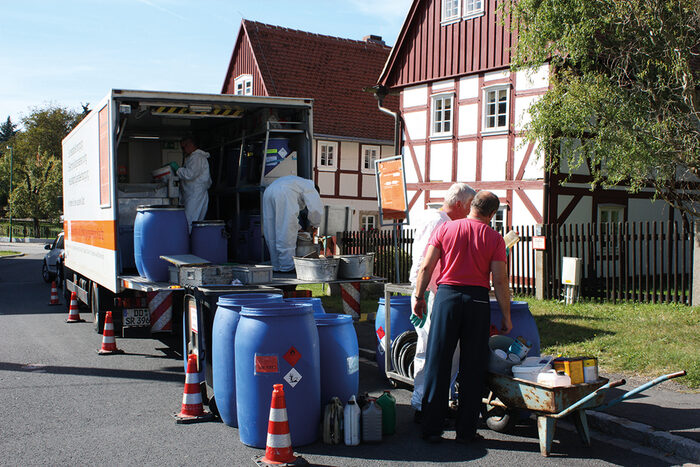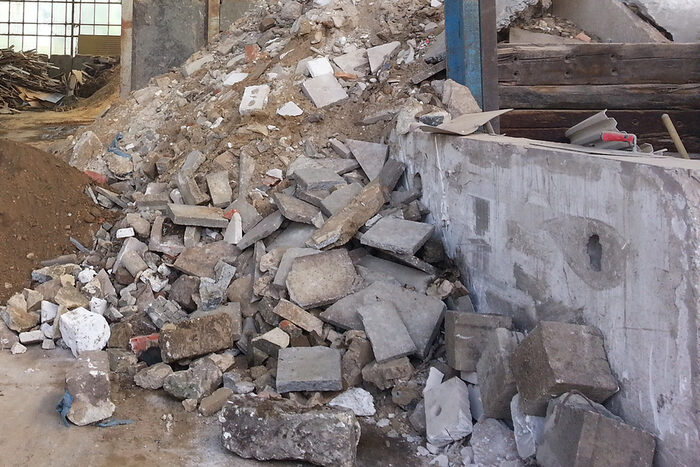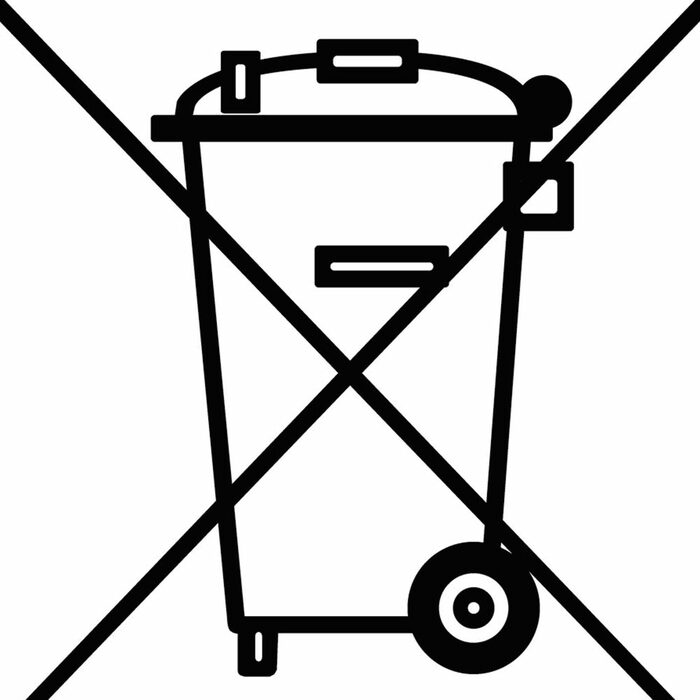|
Landeshauptstadt Dresden - www.dresden.de https://www.dresden.de/en/living/environment/waste/how-it-works.php 17.06.2024 14:41:12 Uhr 29.04.2025 10:10:03 Uhr |
|
Collection of household waste
Organic waste
Bio-waste belongs in the organic waste bin. This is not only ecologically ideal, but also cheaper than disposal in the mixed waste bin.
What belongs in the organic waste bin?
- waste from food preparation and food leftovers (no bones or meat)
- excess or spoiled foodstuffs (unpackaged), e.g., fruit, vegetables, baked goods
- other biogenic household waste such as kitchen paper (no cellulose tissues)
- green household waste, e.g., withered flowers, potted plants, potting soil
- garden waste, e.g., leaves, lawn cuttings, branches cut into small pieces, weeds, fallen fruit
- non-mineral animal litter
- small amounts of cooking fats and oils in absorbent cooking paper
No plastic waste in the organic waste bin!
Plastic bags, including bags made of bioplastics, do not decompose in the recycling process and remain in the compost. This means that it can no longer be used in landscaping.
Use paper waste bags or wrap organic waste in newspaper.
Contaminated bio-waste must be disposed of as mixed waste. You will have to pay an additional fee for incorrectly filled waste bins.
Green waste
Green waste such as flowers, leaves, weeds, fallen fruit or potting soil can be disposed of in the organic waste bin.
Larger, seasonally-occurring quantities of organic waste from home gardens and households such as leaves, cuttings from trees, hedges and lawns can be delivered to the recycling depots and green waste collection points.
A fee is charged for the disposal of green waste. The size of the fees is listed in the waste management fee statute.
Please utilise reusable bins or bags. Otherwise, you empty the waste bags in order to dispose them at home.
Exception: Private households can dispose of the leaves from street trees and horse chestnuts with miner moth infestation free of charge at the recycling depots and green waste collection points.
Paper and cardboard
For the collection of waste paper, municipal blue bins are available, as well as recycling containers for newspapers/magazines and cardboard/waste paper at 320 recycling container locations in Dresden.
Since 2012, all property owners have been able to order the municipal blue bin. The blue bin is emptied without an extra fee. What belongs in it:
- newspapers, magazines
- writing and printer paper
- advertising leaflets
- crumpled and packaging paper
- books without laminated covers
- cardboard and flattened cardboard boxes
Please remember: Only clean waste paper can be recycled. Please always put paper and cardboard in the bin unbundled. Cardboard and cartons should be flattened or unfolded first. Large format packaging is also accepted without an extra fee at all recycling centres.
Incorrectly filled bins must be disposed as mixed municipal waste. You will have to pay an additional fee for this.
Light packaging – yellow bin/sack
Light packaging refers to the type of waste which is collected separately under the Dual System and made available for collection in yellow bins/sacks.
Light packaging usually includes plastics, composites, aluminium or tinplate.
These empty packaging items belong in the yellow bins/sacks:
Plastics
- carrier bags, sachets, foils
- plastic bottles, tubes, plant trays
- packaging for detergents and personal care products
- cubs/pots for margarine, quark or yoghurt, etc.
- fruit and vegetable packaging
- egg cartons (plastic)
- styrofoam packaging, bubble wrap
- screw caps, blister packs (for tablets)
Metals
- food and beverage cans
- lids, bottle caps
- food trays and lids made of aluminium
- spray and paint cans
- aluminium foil
Composites
- cartons for juice and milk
- vacuum packaging
- soup bags
- laminated cardboard from frozen products
Incorrectly filled yellow bins and sacks
If the yellow sack or bin is incorrectly filled, it will not be collected/emptied. You will receive a red sticker. Either the waste that does not belong there must be sorted and removed or the property owner must apply for collection/emptying as mixed municipal waste. You will have to pay an additional fee for this.
Mixed municipal waste
Mixed waste is residual municipal waste such as:
- ash (without embers), sweepings, cigarette butts, vacuum cleaner bags
- nappies, toiletries, cotton wool and cotton buds, cellulose tissues
- fleece wet wipes (cleaning, baby, glasses, make-up removal wipes)
- meat, fish and sausage leftovers, bones
- window and mirror glass, fireproof glass (Jena glass)
- incandescent light bulbs (not energy-saving bulbs or fluorescent tubes)
- rubber, contaminated textiles, exhaust air filter inserts
- small animal excrement in mineral litter, dog excrement in plastic bags
- crystal, porcelain, ceramics
- disposable crockery and cutlery
- leather/imitation leather goods, wallpaper/carpet scraps
- toys, pens, Christmas tree decorations
- non-hazardous leftover medicines
- cosmetics such as creams or lotions
- receipts made of thermal paper
- dried residue of emulsion paints
- cooking and frying oils (small quantities, in a closed container and wrapped in absorbent paper)
- frying fat (small quantities, solid, wrapped in newspaper)
Mixed waste from both households and trades/industry must be handed over to the city of Dresden (according to the waste management statutes).
Waste bins and bags
According to the waste management statutes of the city of Dresden, mixed waste is collected by means of waste containers of various sizes (80L, 120L, 240L, 660L, 1100L and 2500L) and, in exceptional cases, by means of 120L prepaid waste bags printed with: 'Landeshauptstadt Dresden – Gebühr bezahlt'. In case of a predictably higher demand, you might request an additional emptying, which is liable a special fee.
Only waste containers that are at least 75 percent full or have been provided by the property owner for emptying are subject to emptying. The emptying of the waste bins is automatically registered with the date and time and this forms the basis for the charging of fees.
120L mixed waste sacks can be purchased for a fee in the event of a short-term increase in the volume of mixed waste. For collection, please place the bags next to the property's mixed waste containers on the scheduled collection day.
For illegal secondary depositing of mixed waste at the collection sites, fees are charged in accordance with the waste management fee statute of the city of Dresden.
If your bin is permanently insufficient, the landlord must apply for a larger or extra container. In case of shortage of space, you might apply for a more frequent emptying.
to the waste fee overview
Waste disposal in urban areas
Glass packaging
The most important raw material for new glass packaging is waste glass. A major advantage of used glass is that it can be recycled as often as desired.
Glass packaging includes:
- glass bottles, for example, for drinks, wine, oil, vinegar or sauces
- glass jars, e.g., for fruit, vegetables, jams or mustard
- glass flacons for perfume or cosmetics
For the disposal of glass packaging, containers separated into white, brown and green glass are available at around 640 locations in the city area.
to the recycling container sites
Please do not dispose of:
- drinking glasses, teapots, crystal, glass bowls
- glass lampshades, leaded glass
- heat-resistant glass, microwave dishes, glass ceramics
- flat glass such as window, mirror or safety glass
- LED or energy-saving bulbs, fluorescent tubes, incandescent bulbs
These items are not suitable for recycling. Like porcelain, ceramics and stoneware, they belong in the mixed waste bins. Window, mirror and safety glass can be disposed of as construction waste. LEDs, energy-saving bulbs and fluorescent tubes must be handed in at a recycling centre or at the mobile hazardous waste collection vehicle.
Hazardous substances
Under no circumstances should hazardous substances be disposed of in the bins on your property or in the toilet.
Which hazardous waste is accepted?
- ink and varnish residues (liquid)
- leftover solvents
- acids, lyes
- glue and other adhesives
- plant protection products and pesticides
- wood preservatives
- photographic and laboratory chemicals
- cleaning agents, disinfectants
- solvent, stain remover
- waste containing mercury
- spray cans with CFC propellants
- waste oils
- waste containing oil and grease
- batteries, car batteries
- paint strippers
Not accepted:
- explosives
- ammunition
- fireworks
- materials containing asbestos
- gas cylinders
- toner, ink cartridges
- cosmetic products, such as creams and lotions
- dried emulsion paints belong in the residual waste
Disposal free of charge:
Dates and locations of the mobile hazardous waste vehicle
Hazardous waste from households can be disposed of free of charge. However, only household quantities (not more than 25 litres) are accepted.
Please note: Never mix hazardous substances and, if possible, leave them in their original containers!
Construction waste
Construction waste includes:
- building rubble – uniform or as a mixture of concrete, bricks, mortar, natural stone, masonry, tiles, roof tiles, plaster residue, etc.
- construction waste – uniform or mixtures of mineral or non-mineral materials
- (waste) wood
- excavated soil – naturally grown or previously used soil or rock material
- road construction waste
Please note! Disposal is subject to a fee.
If you are unable to deliver construction waste yourself, you must contract a container service for transport. As a waste generator, you must be able to prove that your construction waste has been properly disposed of. You must therefore ensure that you obtain the waste disposal receipt.
Addresses of transport companies and disposal facilities can be found on the internet or in the Yellow Pages.
Christmas trees
At the end of the year, containers and collection points will be set up at over 100 locations in the city area. For a limited period of time, you can dispose of your Christmas tree there free of charge. The trees must be undecorated and delivered without packaging, such as plastic bags.
After the end of the city's Christmas tree collection period, you can dispose of your Christmas tree at the recycling depots and green waste collection points for a fee.
Waste electrical and electronic equipment
In accordance with the German Electrical and Electronic Equipment Act (ElektroG) of 20 October 2015, all electrical and electronic equipment (waste equipment) intended for disposal must be sent for separate collection. Do not dispose of it with household waste. Devices are marked by the manufacturers with the legally required symbol (crossed-out wheeled bin).
Where to take old household electrical appliances?
Old batteries and rechargeable batteries that are not (firmly) enclosed in the device must be removed and disposed of separately. Please hand over lithium batteries (including rechargeable batteries) directly to the reception staff at the collection point or the collection service. Old batteries are also accepted by all retailers who sell them.
Delivery for disposal
All waste electrical and electronic equipment is accepted without an extra fee at the recycling depots operated on behalf of the city.
Exception: Night storage heaters and photovoltaic modules can be handed in free of charge only at a transfer point.
Energy-saving, fluorescent and LED bulbs can also be disposed of at the mobile hazardous waste vehicle, which comes around twice a year.
Dates and locations of the mobile hazardous waste vehicle
Pick up
Large appliances, with at least one side longer than 50 centimetres, can be collected on request from your home for a fee in accordance with the applicable waste management fee statute. Use the card in the waste guidebook or order a collection online (forms currently available in German only).
As a rule, the collection takes place within four weeks. Alternatively, you can order an express collection within three business days (higher charge).

